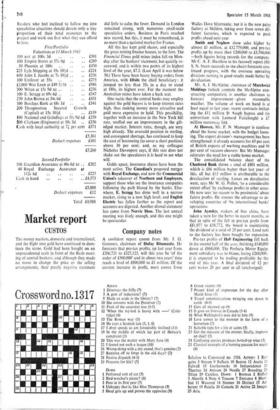Market report
CUSTOS
The money markets, domestic and international, and the flight into gold have continued to dom- inate the scene. Gold had been bought on an unprecedented scale in front of the Basle meet- ing of central bankers; and although they made no move to change the price or the selling arrangements, their purely negative statement did little to calm the fever. Demand in London remained strong, with numerous small:scaIe speculative orders. Business in Paris reached new record, but this, it must be remembered, is no more than a national market for France.
All this has kept gold shares, and especially the great mining finance houses, to the fore. The Financial Times gold mines index fell on Mon- day after the bankers' statement, but quickly re- covered, and is within two points of its highest level of the year, 87.2. (Last April it was below 50.) There have been heavy buying orders from America, with Ofsits the chief beneficiary : it jumped no less than 35s in a day to stand at 180s, its highest ever. For the moment the Australian mines have taken a back seat.
One tactic that the central banks may employ against the gold buyers is to keep interest rates high, thus making money more attractive and gold more expensive to hold. This possibility, together with an increase in the New York bill rate, snuffed out an improvement in the gilt- edged market. Interest rates, though, are very high already. The oversold position in sterling, and consequent shortage, has continued to keep the cost of borrowing (to cover a short position) above 30 per cent; and, as my colleague Nicholas Davenport says, if this rate does not shake out the speculators it is hard to see what will.
Golds apart, insurance shares have been the most active. The Guardian's proposed merger with Royal Exchange, and now the Commercial Union's takeover of Northern and Employers, support those who see the insurance companies following the path blazed by the banks. Else- where, E. Scragg has done well in a narrow market, rising to a new high level; and English Electric has fallen further as the report and accounts are digested. Another dismal statement has come from Norvic Shoe. The last annual meeting was lively enough, and this one might be spectacular.
Company notes
A confident report comes from Mr. J. G. Gommes, chairman of Dufay Bitumastic. He forecasts that pre-tax profits, up last year from £206,721 to £327,123, will this year be 'of the order of £500,000' and in about two years' time reach a level of £800,000 to £1 million. Of the current increase in profit, most comes from
Wailes Dove bitumastic; but it is the new paint factory at Shildon, taking over from seven dif- ferent factories, which is expected to push profits ahead next year.
Smith and Nephew show sales higher by almost £1 million, at £32,779,000, and pre-tax profits up by more than £200,000 to £3,766,000 —both figures being records for the company. Mr C. A. F. Hastilow in his farewell report (Mr S. N. Steen succeeds to the chair) forecasts con- tinued progress, with the overseas operating divisions turning in good results made better by devaluation.
Mr. A. J. McAlpine. chairman of Marchwiel Moldings (which controls the McAlpine con- structing companies), is another chairman to forecast improvement—given reasonable weather. The volume of work on hand is at least equal to last year, recent contracts includ- ing the £11 million St Asaph bypass and (in consortium with Leonard Fairclough) a £7 million motorway link.
At Hoover, Mr. F. N. Mansager is cautious about the home market, with the budget loom- ing. The export division's management has been strengthened: it already accounts for 65 per cent of British exports of washing machines and 99 per cent of vacuum cleaners But Mr Mansager reiterates the need for a stable home market.
The consolidated balance sheet of the Chartered Bank shows a total of £801 million, which is £86 million higher than last year: of this, all but £13 million is attributable to the devaluation of sterling. Losses on devaluation were, says Mr W. G. Pullen, 'to a considerable extent offset' by exchange profits in other areas. He now sees 'no reason to be pessimistic' about future profits. He stresses the advantage to de- veloping countries of the international banks' operations.
John Aynsley, makers of fine china, have taken a turn for the better in recent months, so that in spite of the fall in pre-tax profit- froth £81,977 to £58,772, the board is maintaining the dividend at a total of 25 per cent. Land next to the factory has been bought for expansiot.
Pre-tax profits of Hall Engineering fell back in the second half of the year, finishing £140,000 down at £868,000. The Perfecta Motor Equip- ment subsidiary was to blame, losing £268,000: it is expected to be trading profitably by the end of this year. A final dividend of 12 per cent makes 20 per cent in all (unchanged).










































 Previous page
Previous page